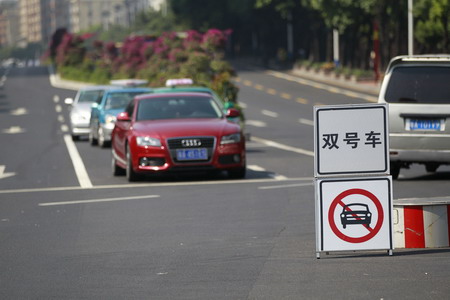China
License plate rule keeps cars off streets
By Qiu Quanlin (China Daily)
Updated: 2010-11-02 07:54
 |
Large Medium Small |
|
 The traffic sign on a road in Guangzhou on Monday says cars with even-numbered license plates are not allowed from 7 am to 8 pm. Zou Zhongpin / China Daily |
GUANGZHOU - A rule to keep nearly half of this southern city's private vehicles off the streets, part of traffic control measures to help improve air quality and ease traffic congestion during the Asian Games, took effect on Monday.
The new measure caused a huge increase in the number of people taking public transportation.
Under the rule - an experience learned from the Beijing Olympic Games in 2008 - vehicles will be banned from city streets from 7 am to 8 pm on alternate days from Nov 1 to 29 and Dec 5 to 21, depending on whether their license plates end in an even or an odd number.
The 45-day control will not apply to public transport and games-related vehicles, sources with the local traffic police authority said.
The number of licensed vehicles in Guangzhou rose from 682,000 in 2004 to more than 1.3 million in 2009, official figures show. Traffic police estimated that up to 40 percent of vehicles will be off the roads during the Asian Games, scheduled to open on Nov 12.
As part of initiatives to benefit from the Asian Games, the local government on Monday also started to offer free public transit for locals to help with commutes.
However, the even-odd rule, together with free rides on buses, subways and ferries, has caused a huge surge in public transportation, especially in subways, in this city of 14 million people.
Temporary traffic controls were introduced in at least eight subway stations during peak time on Monday due to the huge passenger flow, sources with the local metro company said.
"This is the most people that I've seen in the subway. It took me 20 more minutes than usual to get to the office," said Huang Chunhong, a local white-collar worker.
"It's like a nightmare to get into a train. Many people are forced to use public transit due to the even-odd license plate rule. How can I go through the next two months?" Huang said.
With the opening of the Guangzhou-Foshan Line on Wednesday, Guangzhou will have a 236-km subway network of eight lines in operation before the opening of the Asian Games.
An estimated 5.5 million subway trips per day, almost 40 percent more than usual, are expected while the license plate rule is in effect, sources with the local metro company said.
"The increasing passenger flow, reaching an estimated 6.5 million trips in peak time, will pose a great challenge to the city's metro network," Ye Zichuan, an official with Guangzhou Metro Corporation, told China Daily.
To enhance the traffic efficiency in subways, the metro company has introduced emergency plans, such as adding reserved trains to prepare for peak-time operation and opening green channels for passengers with licensed Asian Games working cards.
In another development, local authorities planned to use 13 special lanes designated for the Asian Games, which also began operation on Monday.
In Huanshidong Road, which has a designated lane for the Asian Games, many drivers had to wait for almost half an hour to get through an intersection due to a serious traffic jam during the morning rush hour.
Motor vehicles that are not related to Asian Games are not allowed to use the 125 km of routes from 6 am to 10 pm, or they will face a fine of 150 yuan ($22.40).
China Daily
(China Daily 11/02/2010 page5)